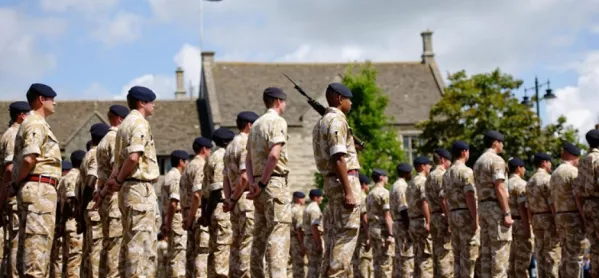The armed forces are being prepared to go into schools and colleges “at short notice” to help on the ground when mass testing for the coronavirus begins next term.
The military already had a role in helping with planning for next term’s testing programme in schools.
But the Ministry of Defence (MoD) has revealed today that the forces will now also have a more hands-on part to play in school testing when it is needed.
Military teams would be “on standby to deploy at short notice to provide in-person support to resolve any issues in the situations where testing would otherwise not be able to go ahead”, it said in a statement.
Covid: Heads warn DfE testing plans place ‘ludicrous’ expectations on schools
New term: Johnson says return of schools will be under ‘constant review’
Demands: School Covid testing needs 8 times the staff predicted
Planning: Army to help schools set up extra Covid testing sites
Heads’ leaders have described the school mass testing plans announced by the government just before Christmas as “undeliverable”. And ministers are under pressure from teaching unions to further delay the start of term.
Today’s government announcement says school students will be “expected to swab themselves in the vast majority of cases, under the supervision of a school staff member or volunteer who has been trained for the role”.
“Teachers are not expected to take a role in the testing process,” the statement says.
But it makes no mention of the outcome of a meeting involving Downing Street and the Department for Education yesterday when school return dates were expected to be discussed.
The MoD said armed forces would “provide planning and training support to secondary schools and colleges with testing”.
The DfE and the Department for Health are being offered 1,500 military staff to “ensure that students and staff can return as safely as possible to secondary schools and colleges across England”, the MoD says.
“The majority of personnel will form local response teams, providing support and phone advice to institutions needing guidance on the testing process and set-up of the testing facilities,” it adds
“This will be done predominantly through webinars and individual meetings, but teams will also be on standby to deploy at short notice to provide in-person support to resolve any issues in the situations where testing would otherwise not be able to go ahead.
“Schools and colleges will shortly be provided with further information on how to request additional support if needed.”
There have concerns about whether the rapid lateral flow tests that will be used in schools are reliable enough.
A scientist has described ministers’ school Covid strategy as “scary stuff”. And a teaching union has warned the testing is a “recipe for disaster” that could actually trigger more school Covid outbreaks because it may fail to pick up infectious pupils who will then stay in class because they’ve been tested.
Education secretary Gavin Williamson said: “It is a true cross-government effort to make sure secondary schools and colleges have the support, guidance, materials and funding they need to offer rapid testing to their staff and students from the start of term.
“I am grateful to the armed forces personnel, and all the school and college staff, leaders and volunteers working to put testing in place. This will help break chains of transmission, fight the virus, and help deliver the national priority of keeping education open for all.”
